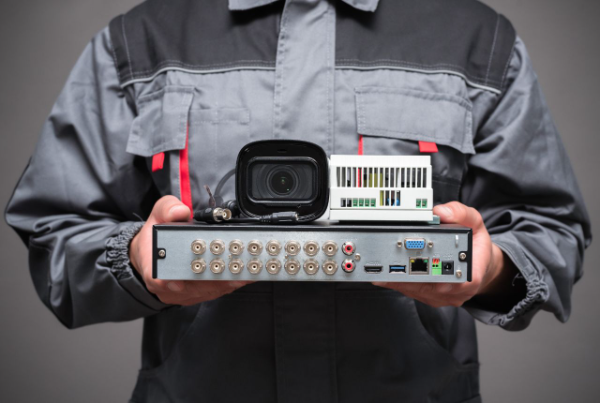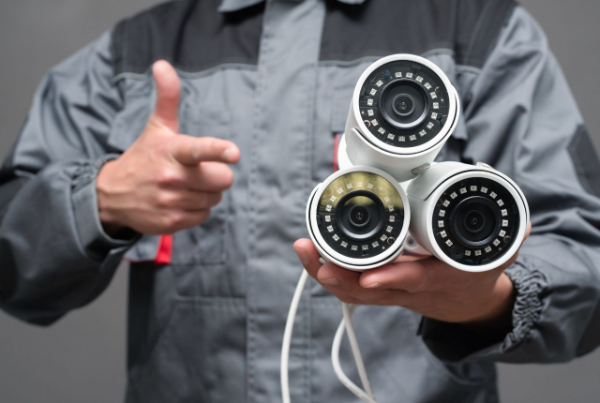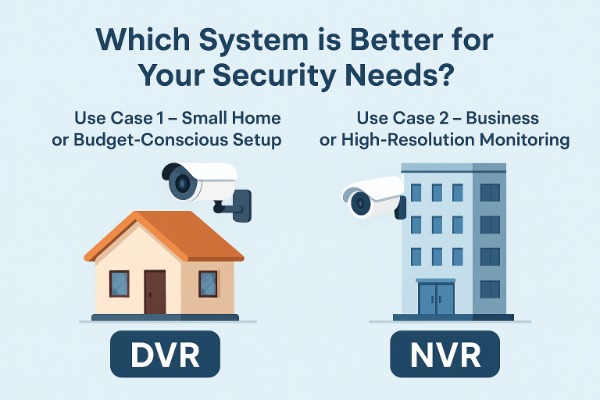Closed-circuit television (CCTV) systems have become very popular today because they can help record images and sounds of events in real-time. However, to ensure the best performance when installing a CCTV system, one of the most important aspects to consider is the recording system. Currently, there are two main types of recording systems: DVR and NVR. Understanding the difference between DVR and NVR is essential, as each system suits different types of cameras and setups. DVR is typically used with analog CCTV cameras, while NVR works with IP CCTV cameras. For those planning to install a new system, it’s worth comparing NVR or DVR: which is better based on your specific security needs and existing infrastructure.

What is a DVR (Digital Video Recorder)?
A DVR, or Digital Video Recorder, is an essential component in many analog video recording systems. It serves as the central hub that records and stores footage captured by analog CCTV cameras. Widely used in both residential and commercial security setups, DVRs are known for their reliability and affordability.
How DVRs Work
To understand what is DVR, it's important to look at how the system functions:
- - Analog Cameras
DVR systems are designed to work specifically with analog CCTV cameras. These cameras capture video in analog format and send the signal directly to the DVR for processing and storage.
- - Coaxial Cable Connections
The video signal from the camera is transmitted via coaxial cables, which connect the analog cameras to the DVR. This type of connection is stable but requires more extensive wiring.
- - Local Recording
Once the signal reaches the DVR, it is converted into a digital format and saved onto a local hard disk. This allows users to play back footage directly from the DVR unit without relying on an internet connection.
Advantages of DVR Systems
There are several advantages to using a DVR-based security setup. Here are some key DVR system pros and cons, starting with the benefits:
- - Lower Cost
DVR systems are generally more budget-friendly, making them an ideal choice for small businesses and homeowners looking for cost-effective surveillance solutions.
- - Simpler Technology
The technology behind DVRs is well-established and easier to set up, especially for users with basic technical knowledge.
- - Wide Compatibility with Analog CCTV
DVRs work seamlessly with many types of analog cameras, offering flexibility for those upgrading from older systems without needing to replace all existing equipment.
Disadvantages of DVR Systems
Despite the benefits, there are limitations to consider when choosing a DVR setup:
- - Limited Resolution
Compared to digital IP camera systems, DVRs often offer lower video quality due to the limitations of analog technology.
- - Bulky Wiring
The use of coaxial cables means more cumbersome installations, especially in large or complex building layouts.
- - Less Flexibility in Camera Placement
Since the cameras need to be physically wired to the DVR, users have fewer options when it comes to camera positioning, particularly in distant or hard-to-reach areas.

What is an NVR (Network Video Recorder)?
An NVR, or Network Video Recorder, is a key component of modern IP-based surveillance systems. Unlike DVRs, which work with analog cameras, NVRs are designed to record video from IP cameras over a network. When considering an NVR vs DVR comparison, NVRs are often chosen for their higher flexibility and advanced features.
How NVRs Work
To better understand what is NVR, it helps to explore how it operates within a surveillance setup:
- - IP Cameras
NVR systems work with IP (Internet Protocol) cameras, which capture and encode video data digitally before sending it directly to the NVR via a network.
- - Ethernet (PoE) Connections
Most NVR systems use Ethernet cables, and many support Power over Ethernet (PoE), allowing a single cable to transmit both data and power. This reduces clutter and simplifies installation.
- - Network-Based Recording
Instead of direct camera-to-recorder wiring, video data is transmitted over a local network and stored digitally on the NVR’s hard drive. This allows for more flexible camera placement and remote access to live or recorded footage.
Advantages of NVR Systems
Choosing an NVR camera system comes with several benefits, especially for users who prioritize high-quality video and smart technology:
- - Higher Resolution Support
NVRs can handle video from high-definition IP cameras, often supporting resolutions of 4K or higher—ideal for detailed surveillance and wide coverage areas.
- - Wireless Options
Many IP camera systems can connect wirelessly to the network, eliminating the need for extensive wiring and enabling easier installation in difficult areas.
- - Advanced Features (e.g. motion detection, AI)
IP cameras used with NVRs often include smart capabilities like motion detection, facial recognition, and AI-based alerts—features that go beyond basic video recording.
Disadvantages of NVR Systems
Despite the advantages, NVR systems are not without their challenges:
- - More Expensive
Compared to DVR setups, NVR systems (and IP cameras) tend to have a higher initial cost.
- - Network Dependence
The performance of an NVR system heavily relies on a stable and high-speed network. Poor connectivity can affect video quality or cause delays in remote access.
- - Setup Complexity
Installation and configuration of an NVR system can be more complex, particularly in large-scale setups or when integrating advanced features.
DVR vs NVR: Side-by-Side Comparison Table
When choosing a video surveillance system, one of the most important decisions is whether to go with a DVR or NVR setup. To help you make an informed choice, here’s a DVR vs NVR comparison chart that highlights the key differences between the two technologies.
| Feature |
DVR |
NVR |
| Camera Type |
Analog CCTV |
IP (digital) |
| Video Quality |
Standard |
High-definition (up to 4K) |
| Wiring |
Coaxial cables |
Ethernet / Wi-Fi |
| Installation |
Simple but rigid |
Flexible but complex |
| Cost |
Lower |
Higher |
This DVR vs NVR for home security comparison shows that while DVR systems may be more affordable and easier to set up, NVR systems offer higher image quality and more advanced features—ideal for those seeking a modern and flexible home surveillance solution.
Whether you're upgrading an existing analog system or setting up a new IP-based network, understanding the strengths and limitations of each option can help you select the right system for your needs.
Which System is Better for Your Security Needs?
When it comes to choosing between DVR or NVR, which is better truly depends on your specific security goals, budget, and environment. Each system has its strengths, so let's explore common use cases to help you decide which one suits your situation best.
Use Case 1 – Small Home or Budget-Conscious Setup
For homeowners looking for a basic home security recording system without breaking the bank, a DVR system is often the ideal choice. It’s cost-effective, easy to install, and works well with existing analog CCTV setups. If your needs are focused on general surveillance—like monitoring front doors, driveways, or small interiors—a DVR can deliver reliable performance without the high costs of digital upgrades.
Use Case 2 – Business or High-Resolution Monitoring
If you need crystal-clear footage, remote access, or plan to scale your system in the future, then an NVR is the better investment. Ideal for businesses or large properties, NVR systems work with high-resolution IP cameras and often support smart features like motion detection and AI-based analytics. Although more expensive, they offer a more modern and flexible solution for advanced monitoring needs.

Final Thoughts: Making the Right Choice
In summary, both DVR and NVR systems have their own pros and cons:
- - DVR Pros: Lower cost, simpler setup, good for analog systems
- - DVR Cons: Lower video quality, limited camera placement flexibility
- - NVR Pros: High-definition recording, wireless options, smart features
- - NVR Cons: Higher cost, network dependency, more complex setup
Before making a decision, consider your budget, the types of cameras you want to use, and how you might expand your system in the future. Whether you're aiming for a simple setup or a scalable, smart surveillance network, choosing the right home security recording system will ensure peace of mind and long-term reliability.
Still not sure whether DVR or NVR is right for you?
Our team of security experts is here to help! Contact us today for a free consultation—we’ll help you design a custom CCTV solution tailored to your property, budget, and long-term needs. Let’s secure what matters most, together.
